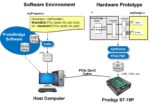According to DARPA the fraction of total power consumed in semiconductors for I/O purposes as been growing rapidly and is creating an I/O power bottleneck. It has reached the point where it needs to be addressed with new technologies and approaches. Interestingly, while the energy density, as measured by pJ/bit for short reach… Read More
Electronic Design Automation
Memory Consistency Checks at RTL. Innovation in Verification
Multicore systems working with shared memory must support a well-defined model for consistency of thread accesses to that memory. There are multiple possible consistency models. Can a design team run memory consistency checks at RTL? Paul Cunningham (GM, Verification at Cadence), Raúl Camposano (Silicon Catalyst, entrepreneur,… Read More
Webinar: A Practical Approach to FinFET Layout Automation That Really Works
There are certain tasks that have been the holy grail of EDA for some time. A real silicon compiler – high level language as input and an optimal, correct layout as output is one. Fully automated analog design – objectives as input, optimal circuit as output is another. With the increased layout times, due to the ever-increasing design… Read More
Cadence Reveals Front-to-Back Safety
This is another level-up story, a direction I am finding increasingly appealing. This is when a critical supplier in the electronics value chain moves beyond islands of design automation to provide an integrated solution for the front-to-back design for capabilities now essential for automotive and industrial automation … Read More
Webinar – How to manage IP-XACT complexity in conjunction with RTL implementation flow
Standards help our EDA and IP industry grow more quickly and with less CAD integration efforts, and IP-XACT is another one of those Accellera standards (1685-2009) that is coming of age, and enabling IP reuse for SoC design teams. Here at SemiWik, we’ve been writing about Defacto Technologies and their prominent use of IP-XACT… Read More
Design Planning and Optimization for 3D and 2.5D Packaging
Introduction
Frequent SemiWiki readers are aware of the growing significance of heterogeneous multi-die packaging technologies, offering a unique opportunity to optimize system-level architectures and implementations. The system performance, power dissipation, and area/volume (PPA/V) characteristics of a multi-die… Read More
Successful SoC Debug with FPGA Prototyping – It’s Really All About Planning and Good Judgement
Using FPGAs to prototype and debug SoCs as part of the SoC design verification hierarchy was pioneered by Quickturn Design Systems in the late 1980’s, and I have observed a wide variety of FPGA prototyping projects over the years. In retrospect, three factors have determined the success of the FPGA prototyping project;
- A good
Neural Network Growth Requires Unprecedented Semiconductor Scaling
The truth is that we are just at the beginning of the Artificial Intelligent (AI) revolution. The capabilities of AI are just now starting to show hints of what the future holds. For instance, cars are using large complex neural network models to not only understand their environment, but to also steer and control themselves. For… Read More
APR Tool Gets a Speed Boost and Uses Less RAM
Automatic Place and Route (APR) tools have been around since the 1980s for IC design teams to use, and before that routing was done manually by very patient layout designers. Initially the big IDMs had their own internal CAD groups coding APR tools in house, but eventually the commercial EDA market picked up this automation area,… Read More
SeaScape: EDA Platform for a Distributed Future
The electronic design community is well aware that it faces a daunting challenge to analyze and sign off the next generation of huge multi-die 3D-IC systems. Most of today’s EDA tools require extraordinary resources in specialized computers with terabytes of RAM and hundreds of processors. Customers don’t want to keep buying… Read More












AI Bubble?